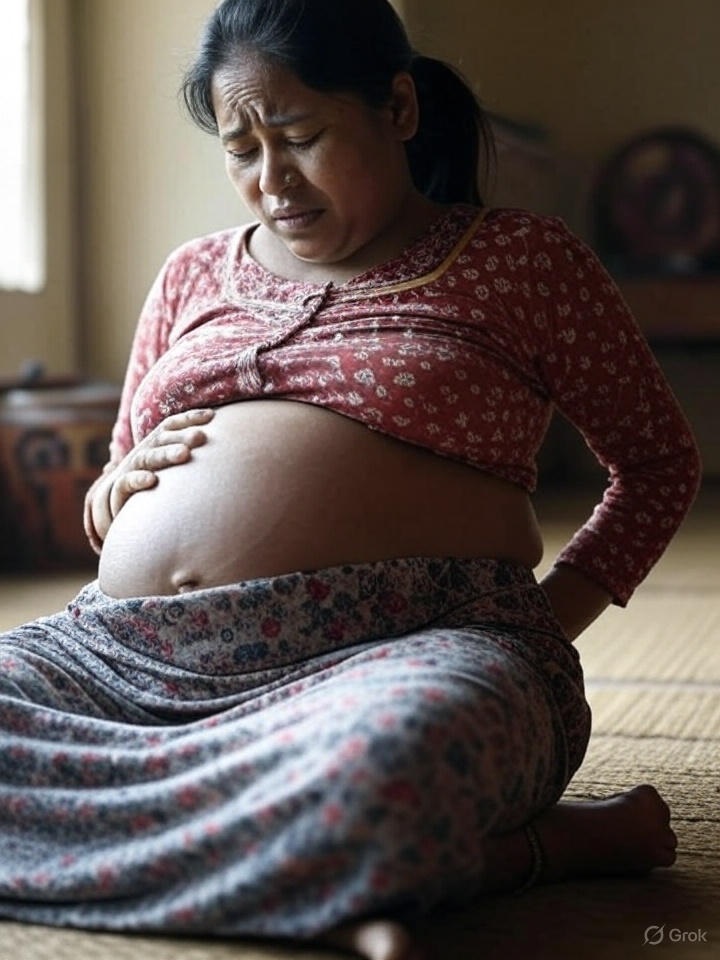Low back pain occurs in over 50% of all pregnancies, reports a 2025 study in the journal BMC Pregnancy and Childbirth. (1)
Despite high prevalence and demonstrated negative impacts on day-to-day life, only few pregnant women seek medical treatment for low back pain. (But you should seek professional help if you need or if your pain is intense)
What Causes Low Back Pain During Pregnancy and Risk Factors
Several factors can cause or contribute to pain in your back or lower back. Most women develop low back pain during the third trimester of pregnancy. However, some studies suggest pain may start anytime during the first trimester.
Fortunately, pain often tends to go away within weeks after delivery.
Your pain can be slightly annoying or severe enough to disrupt your daily activities. Besides, pain typically worsens at night, sometimes causing you to wake up.
Most common causes include:
Hormonal changes
Your hormones go through a rollercoaster ride during pregnancy. Fluctuating hormone levels can directly contribute to inflammation and back pain.
Furthermore, hormonal changes cause structures in your pelvis and lower spine to become soft and flexible, which is your body’s natural way to prepare you for delivery. On the flip side, these changes can strain your lower back, hips, and pelvis, leading to pain and discomfort.
Changes in the center of gravity
A woman typically gains about 30 pounds (approx. 13 kg) during pregnancy. This additional weight in the front of your body pulls you forward and increases stress on the lower back.
Decreased core strength
Your uterus (womb) expands during pregnancy. To accommodate for this, your stomach (core) muscles stretch, resulting in an extra load on the lower back.
Besides, poor posture due to a weak core and additional weight can further strain your lower back.
You may be more likely to get low back pain if you:
- Are obese
- Had low back pain in a previous pregnancy
- Use a soft mattress
- Had low back pain during monthly periods
Can the Baby’s Position Be A Cause of Your Back Pain?
Yes. Your low back pain may be caused by specific fetal positions or a larger fetus.
Low Back Pain During Pregnancy Can Affect Your Quality of Life
Though pain is usually slightly annoying, some pregnant women may find it hard to perform daily activities. Even usual activities like standing or bending over can become a daunting task.
Most notably, pain in your back can severely impact your quality of life. It can affect various aspects of your life. Studies have consistently shown that pain during pregnancy can negatively impact a woman’s: (2)
- Sleep quality (which in turn can make you more vulnerable to pain)
- Sexual activity
- Productivity
Less commonly, severe pain in the lower back can cause physical disability. Moreover, low back pain during pregnancy may also increase your risk of developing mental health conditions, such as anxiety and depression. (3)
Can you prevent low back pain during pregnancy?
It’s typically impossible to prevent low back pain during pregnancy. However, future mothers should be professionally counseled about the potential discomforts during pregnancy.
Strategies to lower the risk can include:
- Staying active before and during pregnancy
- Maintaining a good level of physical fitness (with special focus on the core strength)
Some preventive measures with limited efficacy include:
- Warm shower baths
- Hot packs
- Acupuncture
- Appropriate posture training
Low Back Pain During Pregnancy: Treatment Options and Care
The following measures can help reduce pregnancy-related low back pain.
Stay active
Your level of fitness before and during pregnancy can directly affect your pain response. For example, if you had a stronger core before getting pregnant, you may be less likely to feel pain.
The two most recommended exercises for pregnant women are swimming and walking. These low-impact activities strengthen your muscles and can help improve pain.
Wear a maternity belt
Maternity belts are a great non-pharmacological option to relieve pregnancy-related pain. These specially designed garments help improve mobility and reduce the risk of falling.
Massage
A gentle massage can help relax tight muscles, thereby improving pain and discomfort.
Talk to your physical therapist
A physical therapist can teach specific exercises and stretches that can help relieve pain during pregnancy.
Get enough rest
Avoid standing for prolonged periods and bending over frequently.
When to See A Doctor?
Talk to your healthcare provider if your pain:
- Is severe
- Start suddenly
- Feel like a cramp
- Is accompanied by fever or vaginal bleeding
References:
- Pisoh, D.W., Karelle, N.J., Nchufor, R.N. et al. Low back pain during pregnancy: prevalence, risk factors and clinical profile in the Bamenda Regional Hospital. BMC Pregnancy Childbirth 25, 406 (2025). https://doi.org/10.1186/s12884-025-07506-2
- Fatmarizka, Tiara, et al. “Pregnancy-Related Low Back Pain and the Quality of Life Among Pregnant Women : A Narrative Literature Review.” Journal of Public Health for Tropical and Coastal Region, vol. 4, no. 3, Dec. 2021, pp. 108–16, doi:10.14710/jphtcr.v4i3.10795.
- Uemura, Yuko, et al. “Association of Low Back and Pelvic Pain With Mental Health Condition During Pregnancy and Postpartum.” Health, vol. 10, no. 12, Jan. 2018, pp. 1650–60, doi:10.4236/health.2018.1012124.

